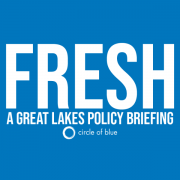FRESH, June 28, 2022: Wisconsin Adopts PFAS Regulation
June 28, 2022
Fresh is a biweekly newsletter from Circle of Blue that unpacks the biggest international, state, and local policy news stories facing the Great Lakes region today. Sign up for Fresh: A Great Lakes Policy Briefing, straight to your inbox, every other Tuesday.
— Laura Gersony, Fresh Editor
This Week’s Watersheds
- The Wisconsin Legislature allows new PFAS standards to take effect.
- Regulators in New York require utilities to perform climate risk assessments.
- The allocation of flooding preparedness funds in the U.S. may violate civil rights laws.
- Canada’s House of Commons considers a bill addressing environmental racism.
- A case before the U.S. Supreme Court could transform federal climate regulation.
The Chicago City Council makes new cooling rules after a heat wave killed three people in an apartment building.
“The expansions to the cooling requirements will help keep our most vulnerable residents safe as we continue to see the impacts of climate change.”— Maria Hadden, 49th Ward AldermanLast week, the Chicago City Council passed an ordinance requiring all senior living homes and new apartment buildings to include permanent air conditioning, the Associated Press reports. The rule change comes after three people were found dead in a North Side apartment during a heat wave in May. Chicago’s heating ordinance already required landlords to regulate apartment building temperatures during cold weather, but it had no similar requirements when the temperature exceeds 68 degrees.
Fresh from the Great Lakes News Collaborative

- Crews work to contain a significant spill in the Flint River — Bridge Michigan
- Why are so many dead invasive fish washing up on Lake Michigan beaches? — Michigan Radio
- Does extreme weather threaten the hazardous waste sites that border Lake Michigan? — Great Lakes Now
- Great Lakes water levels could increase on average from 19 to 44 centimeters in the next few decades, study says — Great Lakes Now
Last month, the Great Lakes News Collective investigated the true cost of water in Michigan. Catch up on this 10 part series here.
The Great Lakes News Collaborative includes Bridge Michigan; Circle of Blue; Great Lakes Now at Detroit Public Television; and Michigan Radio, Michigan’s NPR News Leader. We work together to produce news and information about the impact of climate change, pollution, and aging infrastructure on the Great Lakes and drinking water. This independent journalism is supported by the Charles Stewart Mott Foundation. Find all the work here.

Wisconsin Adopts PFAS Regulation
Wisconsin legislators approved limits on PFAS chemicals in drinking water and surface water, the Associated Press reports. The standards set a limit of 70 parts per trillion in drinking water for PFOA and PFOS, two of the most common PFAS chemicals. The rules also create a standard of 8 parts per trillion in most surface waters. Several areas across Wisconsin are dealing with PFAS contamination in drinking water. State Republicans initially opposed the measure, citing the multi-million dollar price tag for wastewater treatment and the paper mill industry. Water from private wells remains unregulated. It is unclear how an April court decision, which ruled that the state has no authority to enforce PFAS cleanup, will affect the new rules.
In the News
CLIMATE RISK DISCLOSURE: New York state regulators began proceedings that would require large electric utilities to assess and disclose climate risks associated with their operations, writes T&D World. In announcing the rule, the state Public Service Commission argued that the plans will help utilities prepare for and respond to extreme weather events and long-term climate impacts. The regulation is part of the state’s effort, spearheaded by Gov. Kathy Hochul, to better understand electric system vulnerability to climate risks.
FLOODING: A Politico investigation last month found that federal agencies are inequitably distributing flood mitigation funds—but that case may be difficult to argue in court, the news agency writes in a follow-up. Federal Emergency Management Agency funds, which elevate homes in harm’s way, are allocated based on factors that benefit wealthy homeowners, such as prioritizing homes that are worth the most and requiring participants to have flood insurance. But pursuing civil rights litigation may prove difficult. FEMA argues that it does not discriminate based on race or income because it does not collect data on those categories. Opponents say that it also cannot assess disparities as a result.
Looking Ahead
A LANDMARK CASE: The U.S. Supreme Court is weighing a case that could transform federal agencies’ ability to write and enforce regulation, reports E&E News. The case before the court challenges Environmental Protection Agency authority to regulate emissions of the greenhouse gas carbon dioxide. A narrow decision may invoke the “major questions” doctrine — which holds that only legislators may make groundbreaking rules — to limit the agency’s power to address greenhouse gas emissions. Others expect a broader decision: the court may use the case to strengthen the “nondelegation doctrine,” which holds that only Congress, and not federal agencies, can write regulations that hold the force of law. Such a decision would significantly limit the scope of many regulatory agencies, not just those that deal with climate and environment.
ENVIRONMENTAL RACISM: Canada’s House of Commons considers adopting its first-ever legislation on the disproportionate burden of environmental harms on its Black and Indigenous communities, CBC News reports. The bill would require lawmakers to develop a national strategy to evaluate and address these disparities. Canada’s First Nations and Métis communities have long suffered from environmental ills such as disproportionate pollution, flooding, and location near landfills.
- Why it matters: Access to fresh water is among the top environmental injustices facing Canada’s communities of color. In December, Circle of Blue covered a bombshell government report which found that nearly half of First Nations water systems are considered to have substantial deficiencies. Water systems in these areas have barely improved since 2014 despite billions in federal investment, the report found.
Other News
- As the legal battle over the Line 5 pipeline continues, the Fond du Lac Band of Ojibwe urges a Minnesota court not to throw out its case.
- A successful shoreline restoration project in New York could become a prototype for future projects.
- Cleveland leaders hear mounting cries for action on climate change, as the city recovers from a blistering heat wave.
Laura Gersony covers water policy, infrastructure, and energy for Circle of Blue. She also writes FRESH, Circle of Blue’s biweekly digest of Great Lakes policy news, and HotSpots H2O, a monthly column about the regions and populations most at-risk for water-related hazards and conflict. She is an Environmental Studies and Political Science major at the University of Chicago and an avid Lake Michigan swimmer.








Leave a Reply
Want to join the discussion?Feel free to contribute!